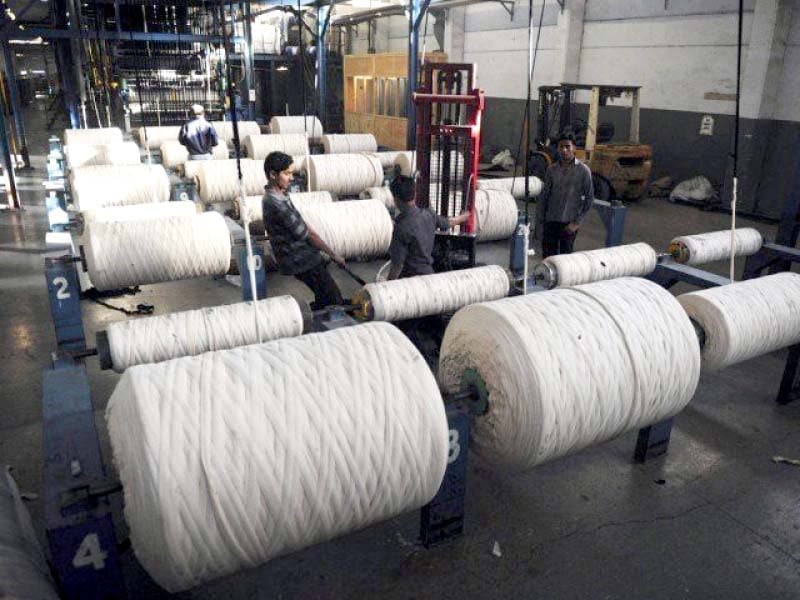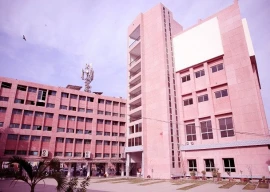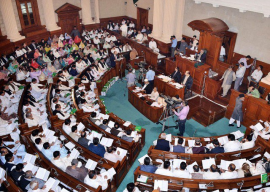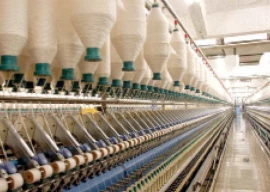
Two major Chinese companies have announced plans to establish plants in Pakistan to produce raw materials for the textile industry, facilitated by the Special Investment Facilitation Council (SIFC).
Rainbow Industries Ltd. from China is set to collaborate with Shaoxing Chemical Industry in a joint venture aimed at revitalizing Pakistan’s textile sector, Express News reported.
The project will bring in millions of dollars in investment, targeting the production of affordable raw materials for local textile manufacturers.
Energy tariffs and external investment challenges remain hurdles for the textile industry, but the Pakistani government is working on measures to mitigate these issues.
The revival of the textile industry was highlighted during a two-day expo organized by Rainbow Group and the Punjab Dyes and Chemical Merchants Association.
The "Nine Color & Chem Expo" attracted over 300 exhibitors from countries including China, Malaysia, Türkiye, and Iran, bringing together key industry stakeholders and business leaders to discuss improvements in the sector.
Additionally, the federal government has already introduced a 10-year duty-free machinery import scheme and the establishment of units in special economic zones for foreign investors.
With support from SIFC, Chinese investment is expected to bring advanced technology and boost the growth of Pakistan’s textile industry.
Last month, leaders of the All Pakistan Textile Mills Association (Aptma) Central and Southern Zone have presented a charter of demands to run the industry in a seamless manner and without any disruption.
Talking to media persons at a press conference, they emphasised the importance of the textile sector, saying it was the backbone of the national economy and was contributing around 55% to the overall export earnings.
Aptma Central Vice Chairman Naveed Ahmed urged the government to reduce interest rate to 6-7% from 19.5%, supply electricity at 8-9 cents per kilowatt-hour (kWh) instead of 14 cents and remove all unreasonable taxes on imports, exports and earnings to enable the industry to run its manufacturing units properly.
Aptma Chairman Southern Zone Zahid Mazhar and other leaders pointed out that the export-oriented textile industries of Sindh and Balochistan were confronting severe problems in the wake of inconsistent supply of both gas and electricity.
Pakistan’s economy pivots around two essentials, ie, textiles and energy because 60% of our exports constitute textiles, while 30% of imports comprise energy.
This becomes more critical when various studies project the export potential at $50 billion per year by 2030, though they were worth only $16.5 billion in FY 2022-23 with the historical maximum reaching $22.1 billion in FY22.
Some sources put this potential even at $100 billion. If realised, it can easily pull us out of the perennial malaise of the deficit in the balance of payments, the primary cause of all of our economic woes.
The textile sector employs about 45% of the total labour force associated with the manufacturing sector.
Also, the industry is heavily dependent on cotton, therefore, any disturbance in the cotton crop also affects the performance of the sector and the economy.
Cotton’s challenges have only grown with time. Its yield was 615 kg per hectare in 1990 and 617 kg in 2020, which is a stark reflection of the poor performance in this segment, especially when China’s yield, now touching 2027 kg/hectare, grew by more than 150% during the same 30 years.









1726722687-0/Express-Tribune-Web-(9)1726722687-0-270x192.webp)









COMMENTS
Comments are moderated and generally will be posted if they are on-topic and not abusive.
For more information, please see our Comments FAQ